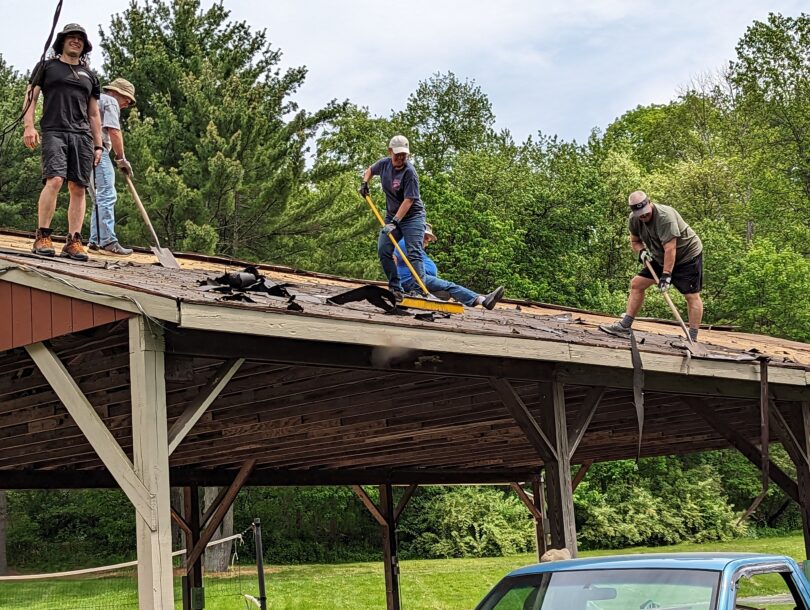(Mission Camp volunteers helping to make Camp Hope (NJ) a better place)
Following the Shepherd Each Day
by Bishop Chris Giesler
Preaching Texts
Psalm 23
John 10:11-18
As we continue in this Easter season we affirm that “The Lord is risen….Indeed!” But really, what difference does that make? How does this affirmation make life any better? What does a risen Lord give us – what does it get me? Or maybe more to the point, how does a resurrected Lord change me?
Without a doubt, we live in a “what’s-in-it-for-me” kind of society. We are a consumer society that makes decisions based primarily on how things benefit us personally So, your parishioners might be wondering: How does an Easter faith benefit me today?
While the words we have from Jesus in John’s 10th chapter were spoken before his crucifixion and resurrection, they take on new meaning in light of the Easter miracle. But again, folks living in Western society in 2024 will be wondering what that means. How does it benefit us today?
It is no mystery that the image of the shepherd is frequently found in Jesus’ teachings. Just as Walmart, super-highways, fast-food, large grocery stores, Facebook, and the internet are a part of our lives today, sheep and shepherds were a part of Jesus’ life. They were ingrained in his heritage and culture. Abraham was the keeper of great flocks. Moses was tending the sheep of his father-in-law when God called him to service. David was a shepherd boy called in from the fields to be the King of Israel. In the Hebrew scripture, the image of a shepherd was often used when referring to their Kings.
The 23rd Psalm, frequently referred to as the “Shepherd Psalm,” opens with the well-known phrase, “The Lord is my shepherd, I shall not want.” Jesus would have certainly known those words by heart. When the Prophet Isaiah spoke of the coming of the Messiah, he said: “He will feed his flock like a shepherd! He will gather his lambs into his arms.” Jesus, his disciples, and those who followed him would have known this reference to a shepherd well.
Jesus told a parable about a shepherd with 100 sheep, one of which wandered off. In our way of thinking, it would be best to stick with the 99, but not this shepherd. He left the 99 to go in search of that one lost sheep. In the account of Jesus feeding the 5000, we are told that when Jesus saw the huge crowd, he had compassion upon them because they were “as sheep without a shepherd. (Mark 6:34)”
Clearly, this image was a dominant one for Jesus, especially when we put these words into focus on our side of the Easter event.
For Jesus, what does that look like? Knowing that sheep have next to no natural defenses to those who would prey on them, the good shepherd protects the flock with his own life, while the bad shepherd would be quick to run and leave the sheep to take care of themselves. Jesus provides this very definition in John 10:11-15: No one takes my life from me, but I lay it down of my own accord. I have power to lay it down, and I have power to take it up again. I have received this command from my Father.”
In other words, Jesus had options. Jesus clearly understood that his life was in danger and that he willingly chose the path of the cross. Jesus’ prayer in the Garden of Gethsemane gives witness to this. He prayed that the cup of suffering might pass from him but then said, “Not my will be you will be done.” (Luke 22:42). This is a loving shepherd dedicated to protecting his flock even at great sacrifice. What are we willing to sacrifice out of thanksgiving for the gift of love? What is sacrificial about our mission in life? What is sacrificial about your congregation’s mission statement?
To truly know the Easter miracle is to be transformed by it in a way that benefits the world around us here and now. Yes, the Easter miracle has eternal dynamics, but it should also impact our mission here and now.
How might your congregation give of itself for the benefit of those in the neighborhood? How might each of us give of ourselves to make the world a better place? What of our time can we sacrifice to clean up our community? What of our talents can we use to comfort someone else? What of our financial resources can we share to empower ministries that help others feel the love of God in tangible ways?
Our Lord has risen, indeed. Let us live this good news today!







